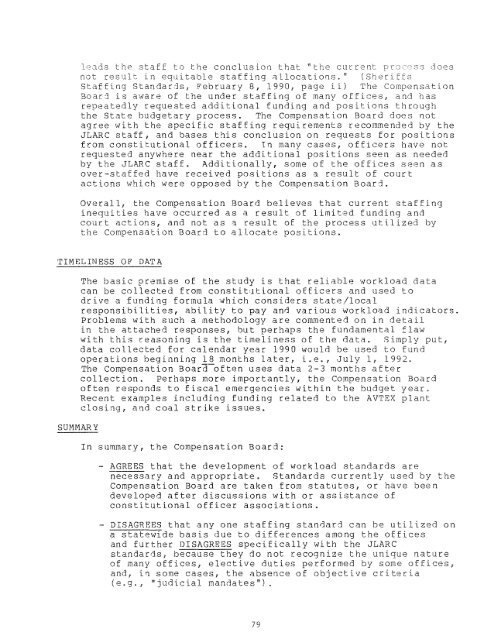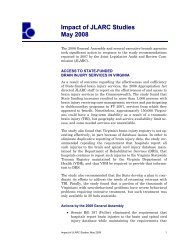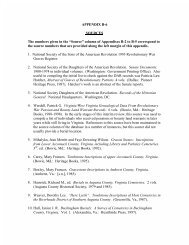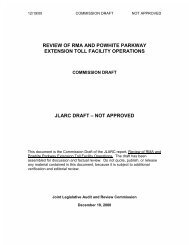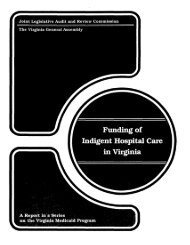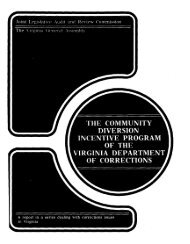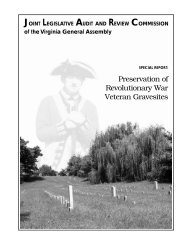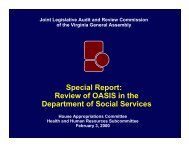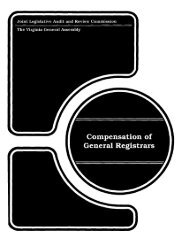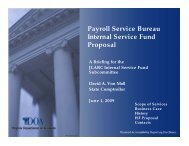Funding of Constitutional Officers - Virginia Joint Legislative Audit ...
Funding of Constitutional Officers - Virginia Joint Legislative Audit ...
Funding of Constitutional Officers - Virginia Joint Legislative Audit ...
Create successful ePaper yourself
Turn your PDF publications into a flip-book with our unique Google optimized e-Paper software.
a s t e staff t the conclusion that t e cu r s<br />
not res in equitable staffing allocations. s<br />
St fing Standards, February 8, 1990, page ii) The nsation<br />
Board is aware <strong>of</strong> the under staffing <strong>of</strong> many <strong>of</strong>fices, and as<br />
repeat ly requested additional funding and positions through<br />
the State bUdgetary process. The Compensation Board does not<br />
agree with the specific staffing requirements recommended by the<br />
JLARC sta , and bases this conclusion on requests for positions<br />
from constitutional <strong>of</strong>ficers. In many cases, <strong>of</strong>ficers have not<br />
requested anywhere near the additional positions seen as needed<br />
by the JLARC staff. Additionally, some <strong>of</strong> the <strong>of</strong>fices seen as<br />
over-staffed have received positions as a result <strong>of</strong> court<br />
actions which were opposed by the Compensation Board.<br />
Overall, the Compensation Board believes that current staffing<br />
inequities have occurred as a result <strong>of</strong> limited funding and<br />
court actions, and not as a result <strong>of</strong> the process utilized by<br />
the nsation Board to allocate positions.<br />
TIMELINESS OF<br />
DATA<br />
The basic premise <strong>of</strong> the study is that reliable workload data<br />
can be collected from constitutional <strong>of</strong>ficers and used to<br />
drive a funding formula which considers state/local<br />
responsibilities, ability to pay and various workload indicators.<br />
Problems with such a methodology are commented on in detail<br />
in the attached responses, but perhaps the fundamental flaw<br />
\Ilith this reasoning is the timeliness <strong>of</strong> the data. Simply put,<br />
data collected for calendar year 1990 would be used to fund<br />
operations beginning 18 months later, i.e., JUly 1, 1992.<br />
The Compensation Board-<strong>of</strong>ten uses data 2-3 months after<br />
collection. Perhaps more importantly, the Compensation Board<br />
<strong>of</strong>ten responds to fiscal emergencies within the budget year.<br />
Recent examples including funding related to the AVTEX plant<br />
closing, and coal strike issues.<br />
SUMMARY<br />
In summary, the Compensation Board:<br />
- AGREES that the development <strong>of</strong> workload standards are<br />
necessary and appropriate. Standards currently used by the<br />
Compensation Board are taken from statutes, or have been<br />
developed after discussions with or assistance <strong>of</strong><br />
constitutional <strong>of</strong>ficer associations.<br />
- DISAGREES that anyone staffing standard can be utilized on<br />
a statewide basis due to differences among the <strong>of</strong>fices<br />
and further DISAGREES specifically with the JLARC<br />
standards because they do not recognize the unique nature<br />
<strong>of</strong> many <strong>of</strong>fices, elective duties performed by some <strong>of</strong>fices<br />
and, in some cases, the absence <strong>of</strong> objective criteria<br />
e.g. "judicial mandates") .<br />
79


